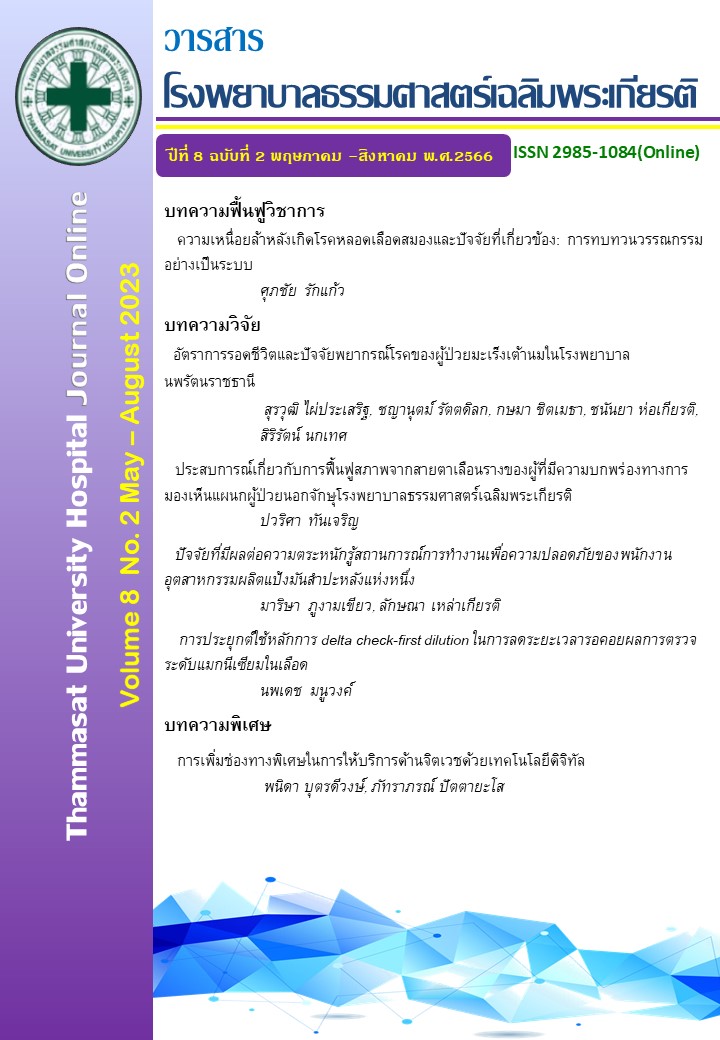Factors Affecting Work Situational Awareness for Safety Among Workers in a Tapioca Starch Industry
Keywords:
Work situation awareness, Work safety, Fatigue, Sleep quality, Workload, Tapioca starch industry workerAbstract
Background: Thailand has a large industrial sector that affects the country's economy, especially in the tapioca starch production industry. The tapioca starch industry is one of the industries that is prone to dust explosions. Awareness of the working situation is a key factor for worker safety. Therefore, it can reduce losses and accidents from operations.
Objective: To study the awareness of the work situation for the safety of workers and study the factors affecting work situation awareness for safety among workers in a tapioca starch industry.
Material and methods: This study was a cross-sectional research. We recruited 287 people. Data were collected using questionnaires and analyzed using descriptive statistics and stepwise multiple regression analysis.
Result: Most workers (70%) were men, 49.2% of than were in 31-40 years group, 38% have more than 10 years of work experience, 57.1% work no more than 48 hours per week, 67.6% have good sleep quality, and 58.2% have a moderate level of fatigue. 48.8% of workers were aware of working situations for safety at a high level. The fatigue and workload can predict the awareness of working situations for workers safety at 17.80 percent.
Conclusion: Fatigue and workload all have an impact on workers’ safety in workplace. Therefore, the industry should have guidelines for managing fatigue and have appropriate work assignments to promote awareness of working situations which may increase the safety of employees.
References
สำนักงานกองทุนเงินทดแทน [อินเตอร์เน็ต]. ปี 2558-2562 [เข้าถึงเมื่อ 31 มกราคม 2564]. Available from: https://www.sso.
go.th/wpr/main/privilege/_sub_category_list-label_1_169_745.
ศราวุฒิ ไชยรัตน์, อารุญ เกตุสาคร. การประยุกต์กระบวนการลำดับชั้นเชิงวิเคราะห์แบบฟัซซีการเกิดฝุ่นระเบิดในกระบวนการผลิตแป้งมันสำปะหลัง. [ม.ป.ท.]: มหาวิทยาลัยธรรมศาสตร์; 2563.
กมลทิพย์ เสงี่ยมชื่น, สุรมงคล นิ่มจิตต์. ความตระหนักรู้ถึงความปลอดภัยและอาชีวอนามัยของพนักงานบริษัทเอ็ม.เอส.เฟริสท์เอ็นเตอร์ไพรส์ จำกัด. วารสารวิชาการบัณฑิตวิทยาลัยสวนดุสิต. 2563; 16(2):45-59.
เสาวณีย์ เผ่าเมือง. พฤติกรรมความปลอดภัยในการทำงานของพนักงานฝ่ายผลิต บริษัท ซีทีเอส อิเล็กทรอนิกส์ คอร์เปอร์เรซั่น: มหาวิทยาลัยราชมงคลเทคโนโลยีธัญบุรี; 2554.
Sneddon A, Mearns K, Flin R. Situation awareness and safety in offshore drill crews. Cognition, Technology & Work. 2006;8(4):255-267.
ชลธิชา แย้มมา, พีรพนธ์ ลือบุญธวัชชัย. ปัญหาการนอนหลับ ความเหนื่อยล้า และประสิทธิภาพในการปฎิบัติงานของพยาบาลวิชาชีพในโรงพยาบาลจุฬาลงกรณ์. วารสารสมาคมจิตแพทย์แห่งประเทศไทย. 2556; 58(2):183-196.
Zadehgholam Z, Kiani F, Khastwo-Hashjin H, Khodabakhsh M. The Role of Fatigue and Work Overload in Predicting Work Situation Awareness among Workers. Int. J. Occup. Hyg. 2015;7(1):38-44.
Kiani F, Borjali A, Farahbakhsh K, Farrokhi N. Predictive Power of Work Situation Awareness by Work Overload and Job Stress among Workers: Implication for Occupational Health. J Health Sci Surveillance Sys. 2015; 3(2):64-70.
อิศราพร จินต์แสวง. การตระหนักรู้ถึงความปลอดภัยบนเที่ยวบินของผู้โดยสารสายการบินนกแอร์: สาขาวิชาการจัดการการบิน สถาบันการบินพลเรือน; 2558.
Kiani F, Baradaran E, Khodabakhsh MR. Sources of Situation Awareness Errors in Workplace (Stress, Sleep Loss and Fatigue) in National Petrochemical. HEHP. 2014; 2(4):45-54.
Downloads
Published
How to Cite
Issue
Section
License
Copyright (c) 2023 Thammasat University Hospital Journal Online

This work is licensed under a Creative Commons Attribution-NonCommercial-NoDerivatives 4.0 International License.



